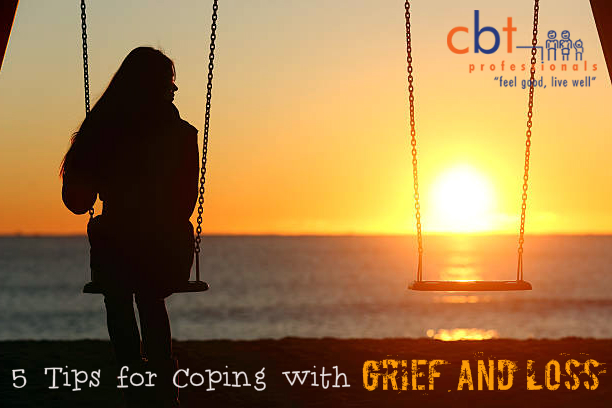Coping with Grief and Loss
It’s an unfortunate reality for all of us that death is part of life. But bereavement can seem so painful and overwhelming we might feel like this is an abnormal and unnatural experience and there is something wrong with us. Coping with grief and loss can be at times overwhelming. However, it is important to remember that grief and loss, no matter how difficult, are natural and normal. Psychologists can help and support those experiencing difficulty working their way through bereavement. This blog firstly provides information on what you can expect to feel when grieving and how grief can impact your emotional world. Then, this blog provides you with a few important tips on how to cope with grief and loss.
Normal feelings during grief and loss
The way people grieve is personal to them, their situation, ethnicity and culture. That means, the symptoms of grief will differ from one person to the next. However, research has identified some common experiences that can occur at different times and in any order during the grief and loss process. These include;
- Shock
- Denial
- Guilt
- Anger
- Sadness
- Longing/yearning
- Acceptance
The impact of grief and loss
Bereavement can be devastating for some people and coping with grief and loss can take time. Initial disbelief can mean the bereaved person may talk as if the deceased is still alive and imagine ‘seeing’ them in familiar and unfamiliar places. A longing or aching for the lost person can mean people surround themselves with reminders which maintain a comforting connection and become difficult to let go of. Sadness can lead to depression which can badly impact sleep, motivation, concentration, enjoyment, physical wellbeing, future planning and hopefulness. A sense of profound regret over things we did or didn’t do/say in the past can lead to guilt and being stuck with terrible thoughts about blame and responsibility. Anger can develop for many reasons and be targeted at the deceased, ourselves, others, and the world. Coupled with guilt, anger can become seemingly uncontrollable and inescapable. NExt we give you five tips to help you cope with grief and loss.
Five tips for coping with grief and loss
- Remind yourself that grieving is difficult but a natural process.
- Give yourself a break. Be kind and compassionate to yourself by allowing yourself time and space to grieve and not setting harsh expectations for recovery.
- Take care of the basics. There is a reason why support people often bring food at times of bereavement. Eating, sleeping, and other self-care basics become even more important during times of grief and loss.
- Accept the support of others. You don’t have to do this alone. People want to help so accept offers of support which meet your needs.
- Express, talk, interact. Be with others, talk with others, and express emotions with others. Human connection and expression can help with understanding and resolving painful thoughts and emotions.
When to seek professional help
If you are feeling like your grief and loss impacting upon your quality of life and or perhaps the intensity of grief is not easing over time, then you might wish to seek professional help. Just like the experience of bereavement, the decision about when to seek professional help is a personal one. Talking this through with a trusted, supportive family member, friend or GP might help with the decision of when to seek professional help. There are no hard and fast guidelines or timeframes and a psychologist will not be expecting clients to meet a specific criteria.
How a psychologist can help
There are many ways a psychologist can help you to cope with grief and loss. An intervention can be tailored to the specific needs of the client. This might include providing a safe, supportive, non-judgmental place to grieve with normalisation and acknowledgement of the distress this can involve. Thoughts and emotions can be identified and explored as part of the process of letting go of unhelpful feelings including guilt and anger. Culturally appropriate mourning rituals or ceremonies may be suggested to help to establish a comforting way to remember a loved one. Any positive emotions can also be discussed and as therapy progresses it might be appropriate to turn the focus to the future and how to start to rebuild a meaningful, fulfilling life.
If you would like to consult one of our friendly clinicians to help you with your grief, please download our Referral Fact Sheet and take it with you to your GP. This will help your GP to make a referral to CBT Professionals. We look forward to helping you soon.
THREE CONVENIENT LOCATIONS
MOUNT GRAVATT
Mt Gravatt Medical PrecinctSE 105, 1808 Logan Rd
Upper Mount Gravatt QLD 4122


